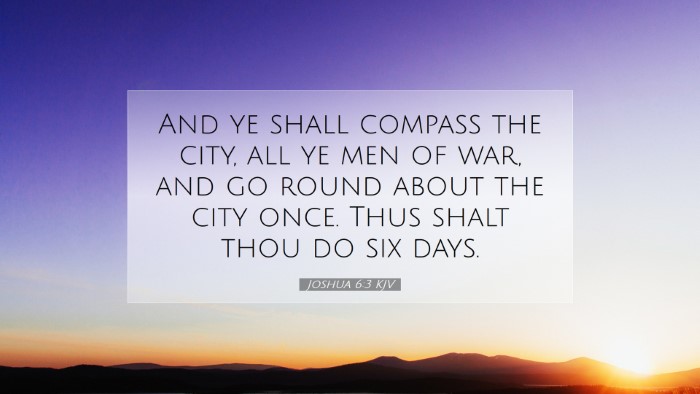Bible Commentary on Joshua 6:3
Verse Reference: Joshua 6:3 - "And ye shall compass the city, all ye men of war, and go round about the city once. Thus shalt thou do six days."
Introduction
This verse is pivotal in the narrative of Joshua's conquest of Jericho, embodying themes of faith, obedience, and divine intervention. The instruction to march around the fortified city serves not only as a strategy but also as a demonstration of trust in God’s promise. By examining this command through the insights of public domain commentators, we gain a richer understanding of its theological implications.
Context of the Command
Historical Background: The Israelites had just crossed the Jordan River into the Promised Land, a momentous event that marked the fulfillment of God's promise to their forefathers. The city of Jericho stood as a formidable barrier, representing both a physical and spiritual challenge to the Israelites. It was crucial for them to rely on God’s power rather than their own strength.
Insights from Commentators
-
Matthew Henry:
Henry emphasizes the uniqueness of God’s strategy. The command to march and not assault directly required deep faith in God’s plan. It illustrated that victories are not solely won through military might but through divine favor and obedience. The act of marching signifies a commitment to God's will, wherein the Israelites demonstrated their trust amid formidable opposition.
-
Albert Barnes:
Barnes points out that God’s instructions often defy conventional military tactics, underscoring the spiritual nature of the battle. He suggests that the act of circling the city symbolized repeated acknowledgment of Jericho's fortified walls and, importantly, a recognition of God's supremacy over them. This act was a lesson in patience and reliance on divine strategy rather than human understanding.
-
Adam Clarke:
Clarke elaborates on the physical and ritualistic aspects of the command. He interprets the daily march as not merely a military exercise but as a spiritual discipline. This repetitive act was a form of worship in motion, echoing themes of perseverance and faithfulness in the believer's walk with God. Clarke’s insights reflect the principle that success in spiritual endeavors often requires continued faith and commitment, reflected through mundane actions.
The Theological Significance
This verse is rich in theological significance, principally highlighting themes of obedience, faith, and divine intervention.
1. Obedience to Divine Command
The directive to march around Jericho exemplifies explicit obedience to God’s command. This aligns with the broader biblical theme that obedience is paramount for receiving God's promises. The Israelites were to follow God's instructions diligently, trusting that God’s method was superior to human reasoning.
2. Faith in God’s Method
This narrative compels believers to reflect on the nature of faith. The Israelites had to believe that such a seemingly irrational tactic would yield victory. For pastors and theologians, this serves as a teaching point: faith often requires stepping outside conventional wisdom and trusting God's larger plan.
3. Divine Sovereignty
The events surrounding the conquest of Jericho underscore the sovereignty of God in the affairs of men. This divine sovereignty reassures believers that God is at work in situations that appear insurmountable, manifesting His power through human obedience.
Practical Applications
For pastors, students, and scholars, Joshua 6:3 provides ample material for practical application in both personal and communal contexts.
-
Trusting God's Process:
This verse invites believers to trust in God’s processes, even when they seem illogical. As church leaders, time should be invested in encouraging congregants to embrace God's timing and methods in their lives.
-
Perseverance in Faith:
The six days of marching can be seen as a metaphor for spiritual perseverance. This can serve as a teaching moment in sermons or studies, illustrating that spiritual victories often require sustained effort.
-
Restoration of Worship:
The act of marching can be construed as a form of worship, reminding the congregation of the importance of integrating faith into everyday actions. Pastors may encourage worship practices that reflect this active obedience.
Conclusion
Joshua 6:3 stands as a testimony to the might and wisdom of God in the face of human challenges. Through the lens of commentary from respected biblical scholars, we observe a comprehensive view of the necessity of obedience, the nature of faith, and the assurance of divine sovereignty. This verse not only speaks to the historical journey of the Israelites but also reverberates through the ages, providing timeless truths for believers today.


